Macroeconomics Report: Singapore's Economic Analysis and Policies
VerifiedAdded on 2019/09/16

Paraphrase This Document
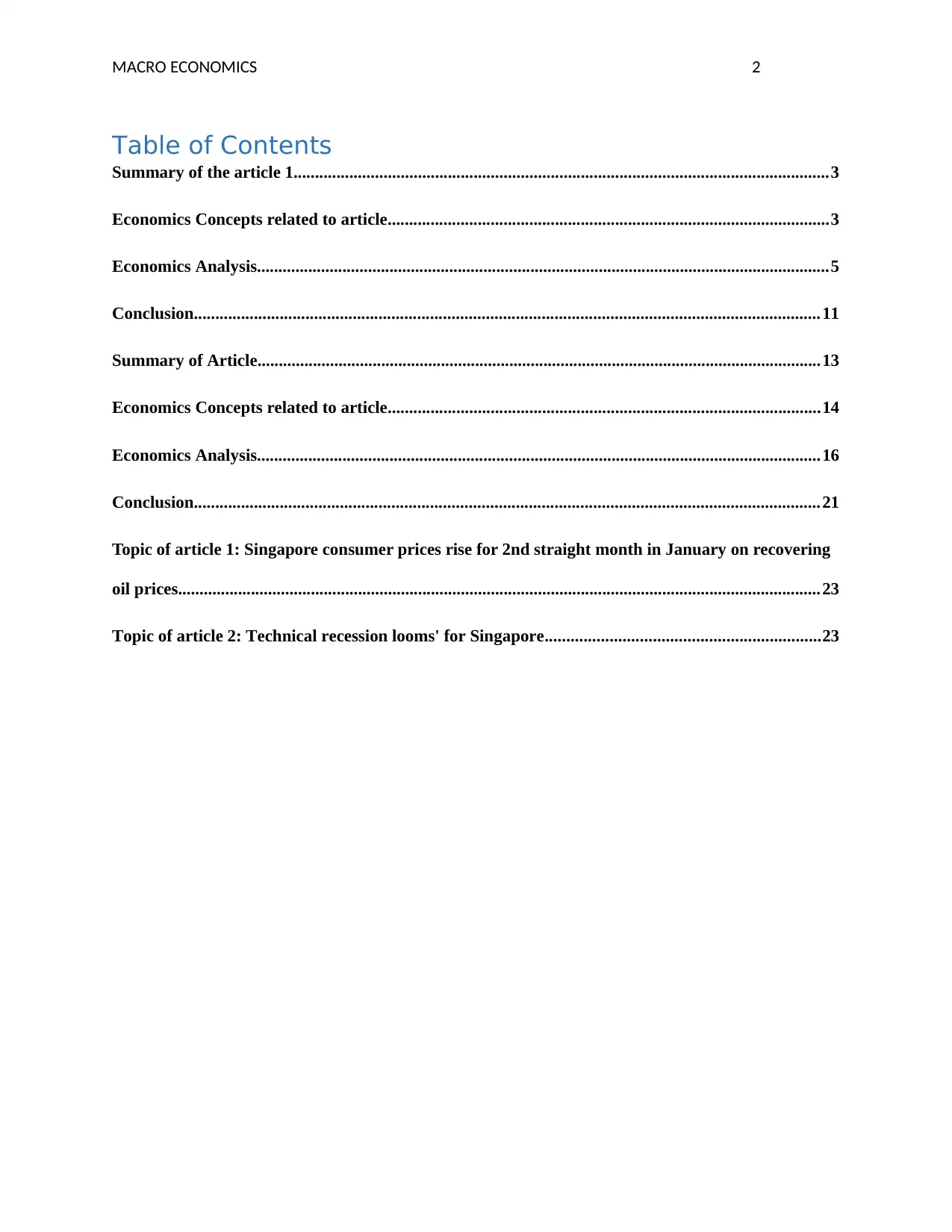
Table of Contents
Summary of the article 1.............................................................................................................................3
Economics Concepts related to article.......................................................................................................3
Economics Analysis......................................................................................................................................5
Conclusion..................................................................................................................................................11
Summary of Article....................................................................................................................................13
Economics Concepts related to article.....................................................................................................14
Economics Analysis....................................................................................................................................16
Conclusion..................................................................................................................................................21
Topic of article 1: Singapore consumer prices rise for 2nd straight month in January on recovering
oil prices......................................................................................................................................................23
Topic of article 2: Technical recession looms' for Singapore................................................................23
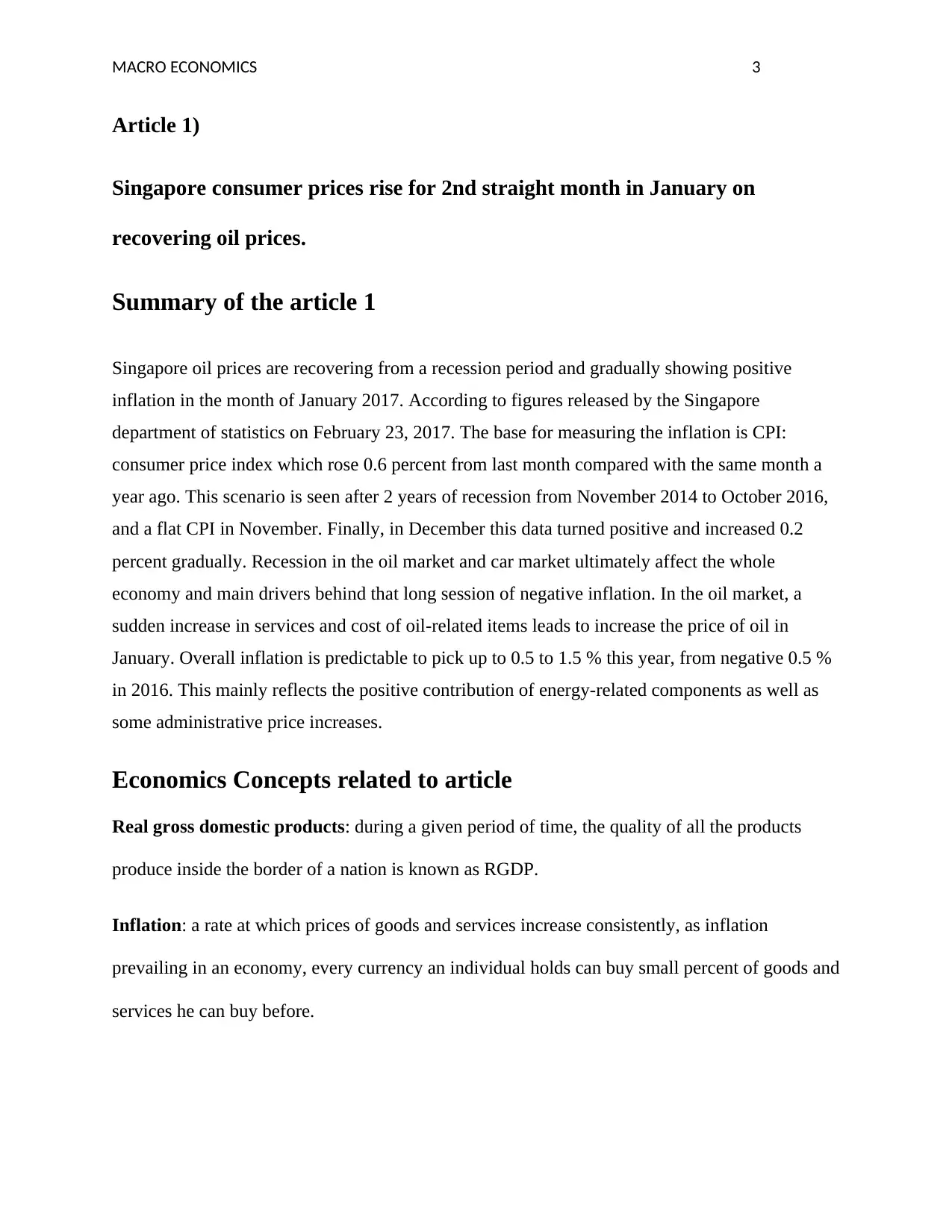
Article 1)
Singapore consumer prices rise for 2nd straight month in January on
recovering oil prices.
Summary of the article 1
Singapore oil prices are recovering from a recession period and gradually showing positive
inflation in the month of January 2017. According to figures released by the Singapore
department of statistics on February 23, 2017. The base for measuring the inflation is CPI:
consumer price index which rose 0.6 percent from last month compared with the same month a
year ago. This scenario is seen after 2 years of recession from November 2014 to October 2016,
and a flat CPI in November. Finally, in December this data turned positive and increased 0.2
percent gradually. Recession in the oil market and car market ultimately affect the whole
economy and main drivers behind that long session of negative inflation. In the oil market, a
sudden increase in services and cost of oil-related items leads to increase the price of oil in
January. Overall inflation is predictable to pick up to 0.5 to 1.5 % this year, from negative 0.5 %
in 2016. This mainly reflects the positive contribution of energy-related components as well as
some administrative price increases.
Economics Concepts related to article
Real gross domestic products: during a given period of time, the quality of all the products
produce inside the border of a nation is known as RGDP.
Inflation: a rate at which prices of goods and services increase consistently, as inflation
prevailing in an economy, every currency an individual holds can buy small percent of goods and
services he can buy before.
⊘ This is a preview!⊘
Do you want full access?
Subscribe today to unlock all pages.

Trusted by 1+ million students worldwide

Cost-push inflation: when the prices of inputs like labor, raw material, etc. lead to increase the
cost of production; as a result price of that product increases as well, known as cost-push
inflation.
Recession: consistent fall in prices and output in two successive quarters which leads to falling
in RGDP and a period of temporary decline of trade and production activities.
Aggregate demand: at a given period of time, the final demand of goods and services from all
the individuals in an economy is referred as aggregate demand.
Aggregate supply: during a specific period of time, the total quantity of goods and services an
economy is planning to supply is refers as aggregate supply.
Unemployment – workforce those are willing to work and looking for work but not able to find
any work are refers as unemployed, and percentage of them with reference to total population is
unemployment.
Expansionary fiscal policy: It is a policy by the government which is adopted so that the
money supply in the economy gets increased and the rate of inflation is raised. This is done by
decreasing the rate of taxes and increasing the expenditure of the government (Hansen, 2013).
Thus, this helps in fighting the recessionary pressures of the economy. When the taxes are
reduced, the disposable income of the people gets increased. Thus they spend more and consume
more. When the goods and services are invested into, and the people spend more, the GDP of the
country gets improved.
Full employment: It is a condition where all the people who can work and they are willing to
work are employed in the economy at a particular time (Beveridge, 2014).
Paraphrase This Document

Economics Analysis
Determination of price in the economy
At a given period of time, the final demand of goods and services from all the individuals in an
economy is referred as aggregate demand. Aggregate demand is a combination of consumption,
investment , government and net export.
AD = C+ I + G + (X-M)
Where,
AD is aggregate demand
C is consumption
I is investment
G is government expenditure
X is export
M is import
During a specific period of time, the total amount of products and services an economy is
planning to supply is refers as aggregate supply. Aggregate supply is different in the long and
short run, in short run aggregate supply is upward sloping because an economy is below full
employment and able to achieve full employment gradually. On the other hand, in long run
aggregate supply is vertical, and economy ultimately reaches full employment level. In an

economy, the price of all the goods and services are determined by the intersection of aggregate
demand and aggregate supply. As shown in below diagram:
Determination of price by intersection of AD & AS
In the above diagram, the prices of goods and services are determined at point ‘e’ when the
aggregate demand (AD) curve intersects aggregate demand (AS) curve. This is the level at which
the optimal level of price and output of the economy can be determined.
Due to fall in oil prices in, the whole economy gets affected, Recession in the oil market, and car
market ultimately affects the whole economy and main drivers behind that long session of
negative inflation.
⊘ This is a preview!⊘
Do you want full access?
Subscribe today to unlock all pages.

Trusted by 1+ million students worldwide
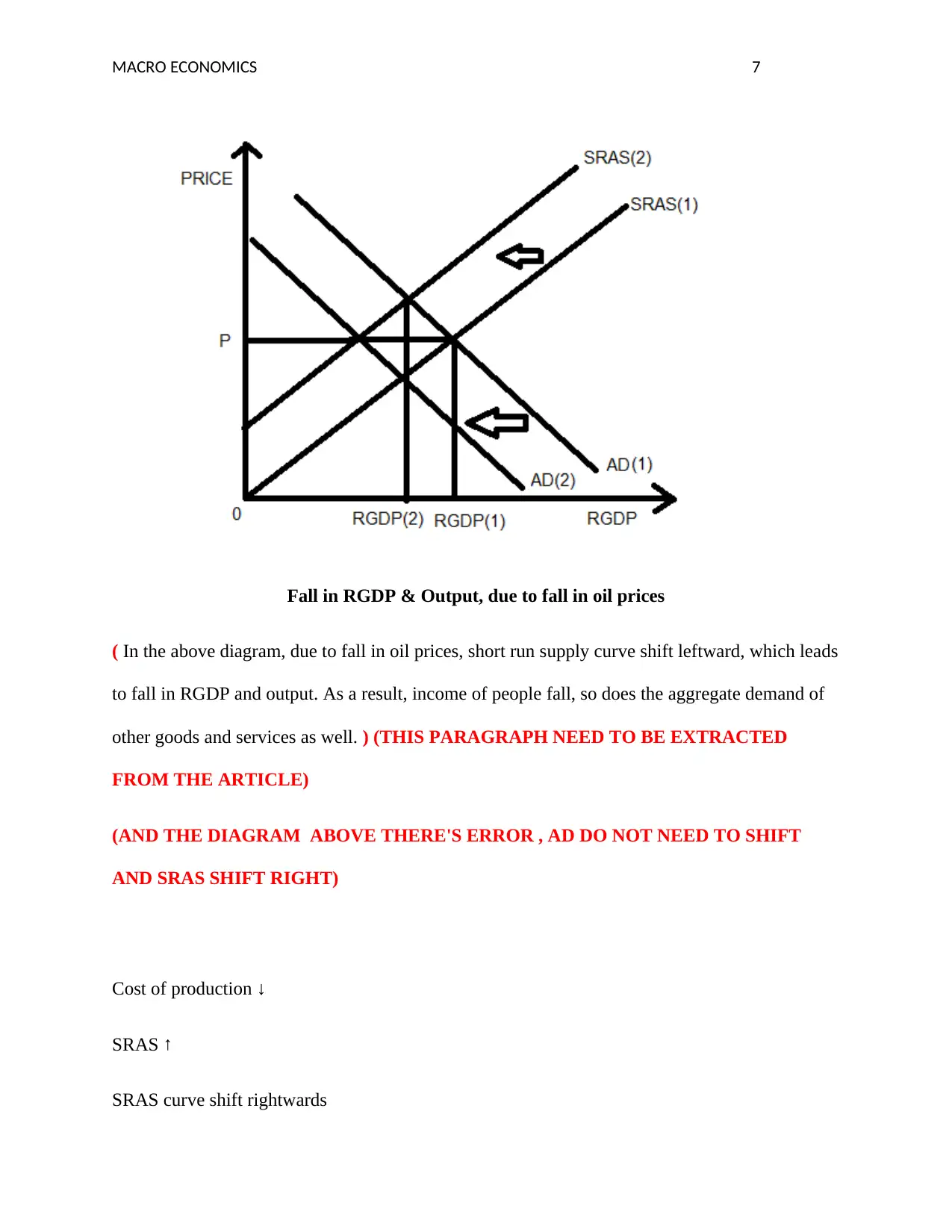
Fall in RGDP & Output, due to fall in oil prices
( In the above diagram, due to fall in oil prices, short run supply curve shift leftward, which leads
to fall in RGDP and output. As a result, income of people fall, so does the aggregate demand of
other goods and services as well. ) (THIS PARAGRAPH NEED TO BE EXTRACTED
FROM THE ARTICLE)
(AND THE DIAGRAM ABOVE THERE'S ERROR , AD DO NOT NEED TO SHIFT
AND SRAS SHIFT RIGHT)
Cost of production ↓
SRAS ↑
SRAS curve shift rightwards
Paraphrase This Document
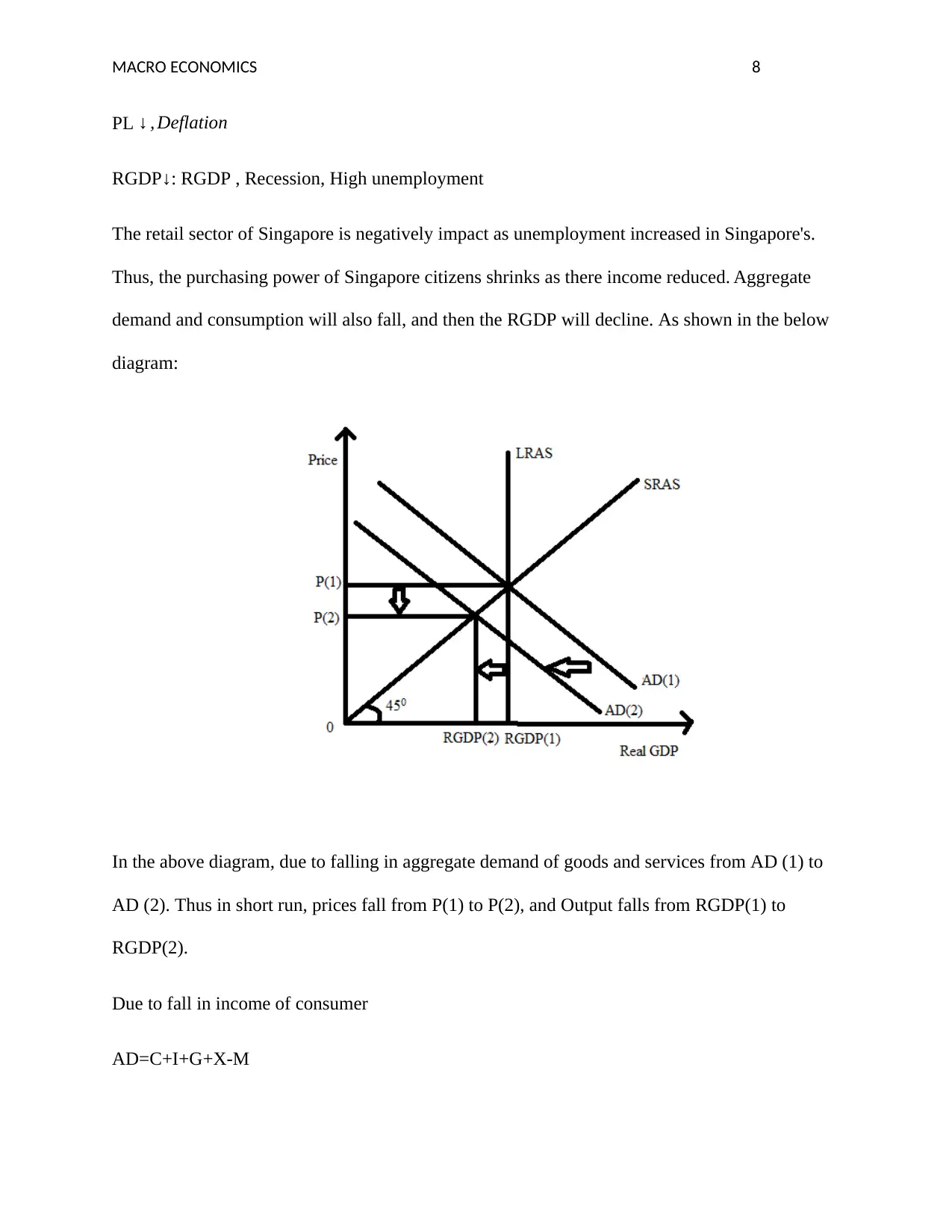
PL ↓ , Deflation
RGDP↓: RGDP , Recession, High unemployment
The retail sector of Singapore is negatively impact as unemployment increased in Singapore's.
Thus, the purchasing power of Singapore citizens shrinks as there income reduced. Aggregate
demand and consumption will also fall, and then the RGDP will decline. As shown in the below
diagram:
In the above diagram, due to falling in aggregate demand of goods and services from AD (1) to
AD (2). Thus in short run, prices fall from P(1) to P(2), and Output falls from RGDP(1) to
RGDP(2).
Due to fall in income of consumer
AD=C+I+G+X-M
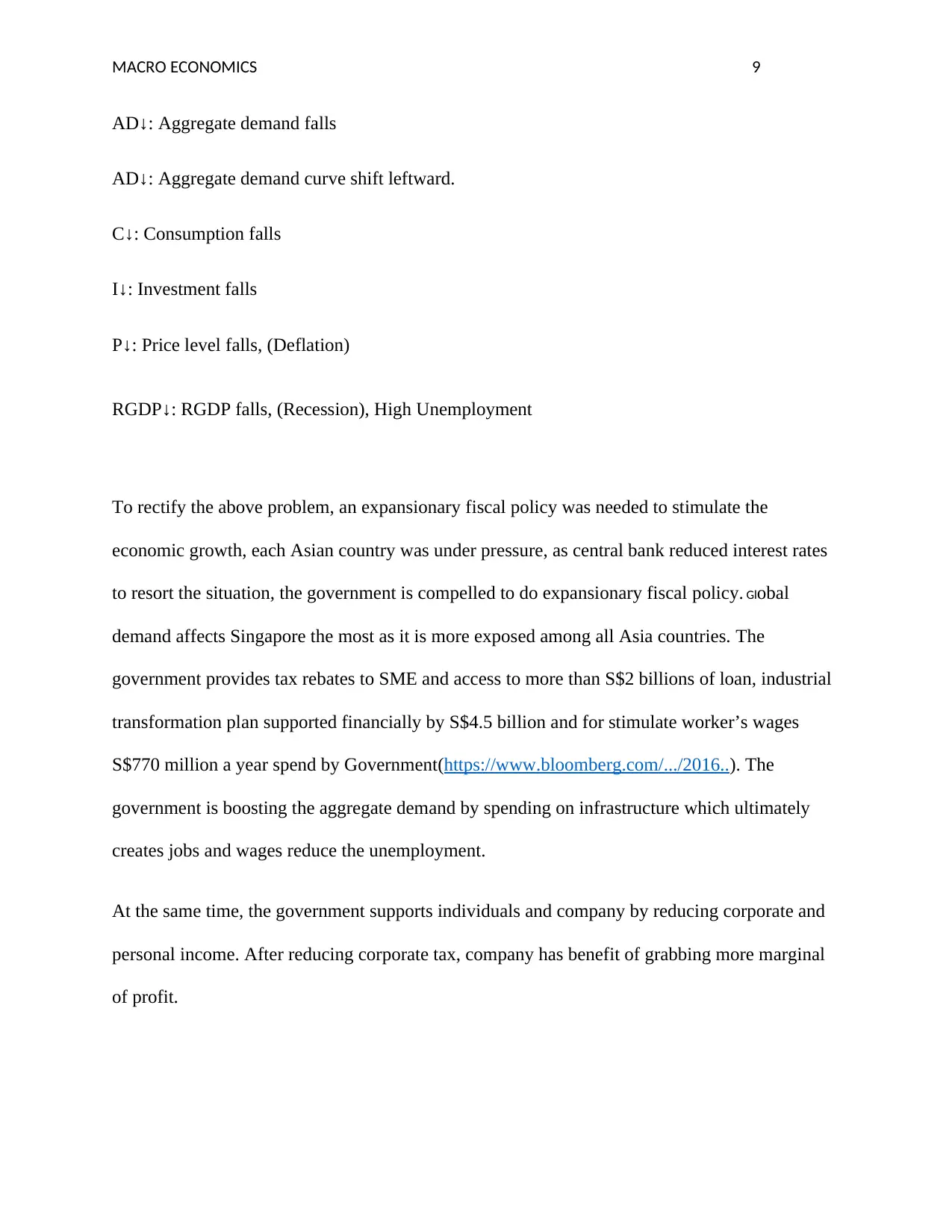
AD↓: Aggregate demand falls
AD↓: Aggregate demand curve shift leftward.
C↓: Consumption falls
I↓: Investment falls
P↓: Price level falls, (Deflation)
RGDP↓: RGDP falls, (Recession), High Unemployment
To rectify the above problem, an expansionary fiscal policy was needed to stimulate the
economic growth, each Asian country was under pressure, as central bank reduced interest rates
to resort the situation, the government is compelled to do expansionary fiscal policy. Global
demand affects Singapore the most as it is more exposed among all Asia countries. The
government provides tax rebates to SME and access to more than S$2 billions of loan, industrial
transformation plan supported financially by S$4.5 billion and for stimulate worker’s wages
S$770 million a year spend by Government(https://www.bloomberg.com/.../2016..). The
government is boosting the aggregate demand by spending on infrastructure which ultimately
creates jobs and wages reduce the unemployment.
At the same time, the government supports individuals and company by reducing corporate and
personal income. After reducing corporate tax, company has benefit of grabbing more marginal
of profit.
⊘ This is a preview!⊘
Do you want full access?
Subscribe today to unlock all pages.

Trusted by 1+ million students worldwide
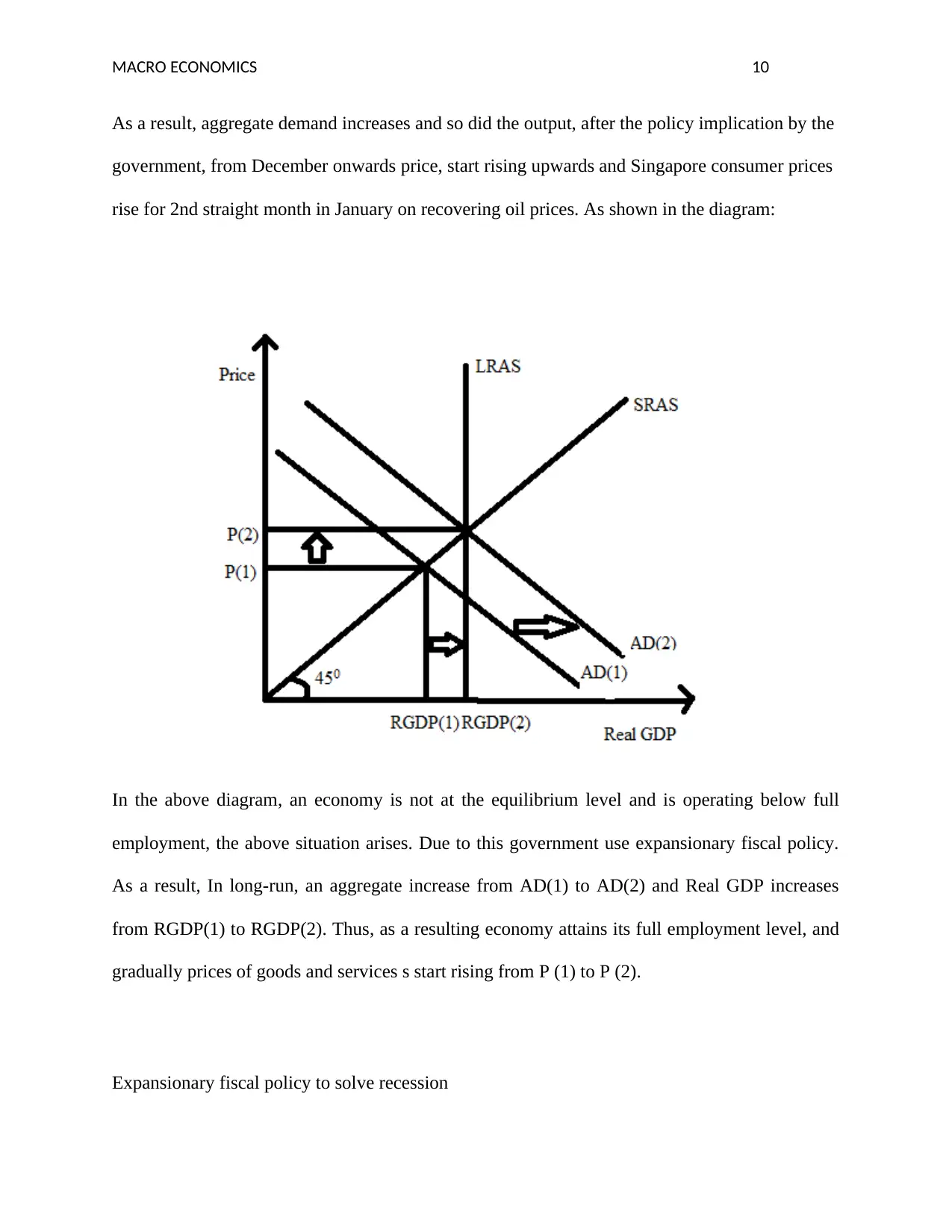
As a result, aggregate demand increases and so did the output, after the policy implication by the
government, from December onwards price, start rising upwards and Singapore consumer prices
rise for 2nd straight month in January on recovering oil prices. As shown in the diagram:
In the above diagram, an economy is not at the equilibrium level and is operating below full
employment, the above situation arises. Due to this government use expansionary fiscal policy.
As a result, In long-run, an aggregate increase from AD(1) to AD(2) and Real GDP increases
from RGDP(1) to RGDP(2). Thus, as a resulting economy attains its full employment level, and
gradually prices of goods and services s start rising from P (1) to P (2).
Expansionary fiscal policy to solve recession
Paraphrase This Document

Fiscal policy tools
G↑: Government increases
T↓: Taxes falls
-income tax ↓
-business tax ↓
AD= C+I+G+X-M
AD↑: Aggregate Demand increase
AD↑: Aggregate Demand shift rightward
P↑: Price Level increase, (Inflation)
RGDP↑: RGDP increase, (Expansion), Low unemployment
With the expansionary policy, the economy of a country grows in terms of GDP, increase in the
rate of employment, etc. With the rise in people getting absorbed in the labor market, the
employment rate will rise, and thus, the full employment will be reached after a certain point of
time. When all the people who are able to work and who want to work are earning in the
economy, then the money supply in the country will rise. They will spend more and invest more.
With the increase in investment, the rate of interest is likely to fall, and thus, Fed will not be able
to increase these rates.
Conclusion
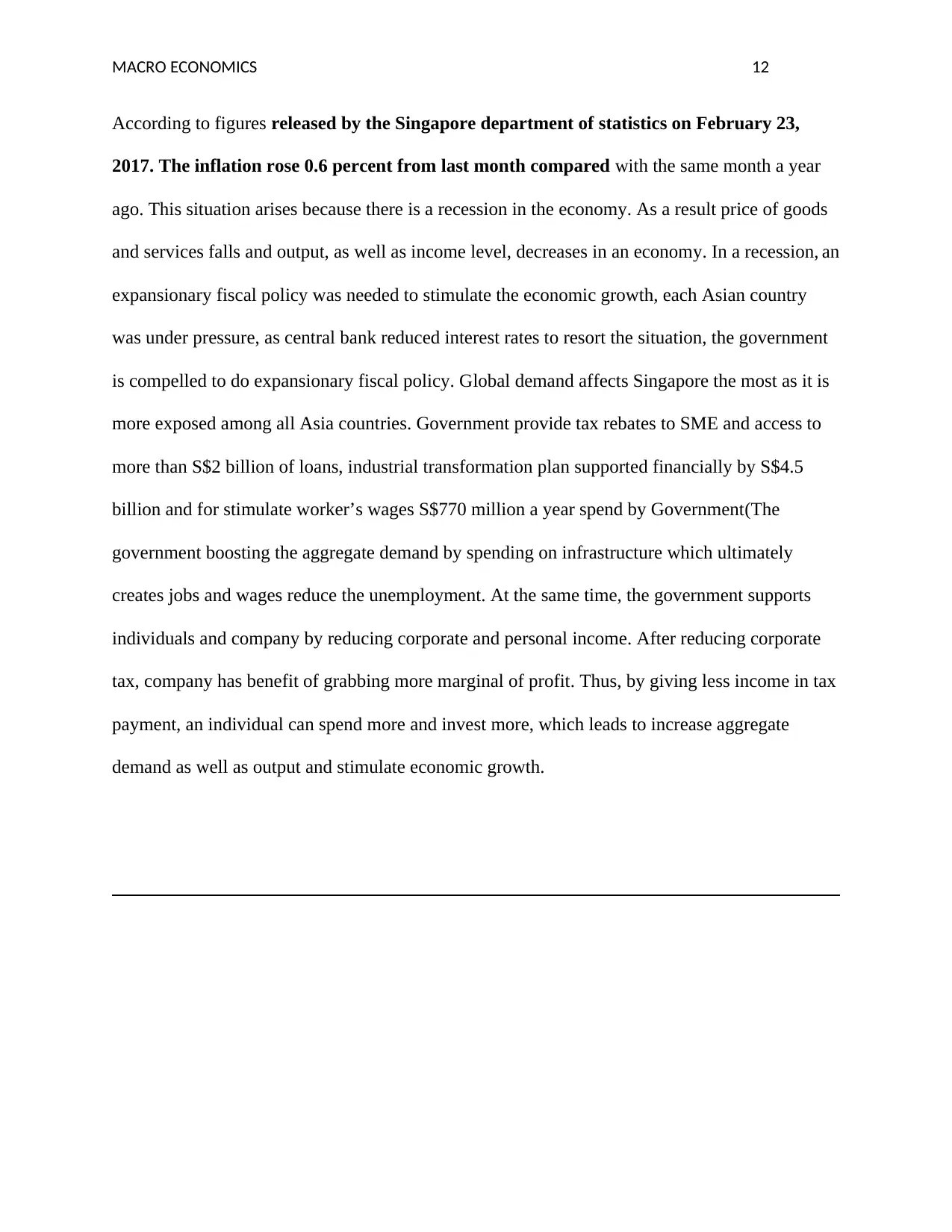
According to figures released by the Singapore department of statistics on February 23,
2017. The inflation rose 0.6 percent from last month compared with the same month a year
ago. This situation arises because there is a recession in the economy. As a result price of goods
and services falls and output, as well as income level, decreases in an economy. In a recession, an
expansionary fiscal policy was needed to stimulate the economic growth, each Asian country
was under pressure, as central bank reduced interest rates to resort the situation, the government
is compelled to do expansionary fiscal policy. Global demand affects Singapore the most as it is
more exposed among all Asia countries. Government provide tax rebates to SME and access to
more than S$2 billion of loans, industrial transformation plan supported financially by S$4.5
billion and for stimulate worker’s wages S$770 million a year spend by Government(The
government boosting the aggregate demand by spending on infrastructure which ultimately
creates jobs and wages reduce the unemployment. At the same time, the government supports
individuals and company by reducing corporate and personal income. After reducing corporate
tax, company has benefit of grabbing more marginal of profit. Thus, by giving less income in tax
payment, an individual can spend more and invest more, which leads to increase aggregate
demand as well as output and stimulate economic growth.
⊘ This is a preview!⊘
Do you want full access?
Subscribe today to unlock all pages.

Trusted by 1+ million students worldwide
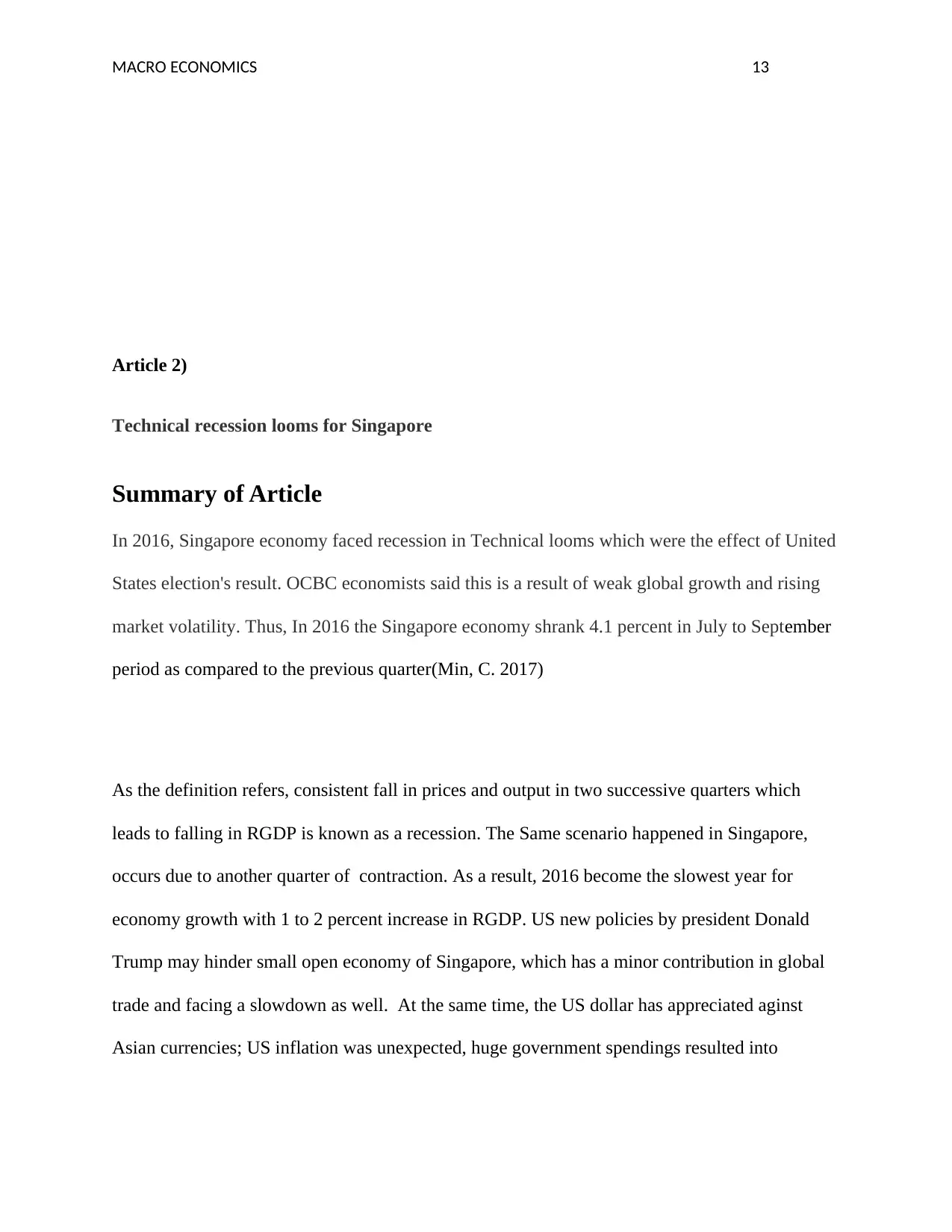
Article 2)
Technical recession looms for Singapore
Summary of Article
In 2016, Singapore economy faced recession in Technical looms which were the effect of United
States election's result. OCBC economists said this is a result of weak global growth and rising
market volatility. Thus, In 2016 the Singapore economy shrank 4.1 percent in July to September
period as compared to the previous quarter(Min, C. 2017)
As the definition refers, consistent fall in prices and output in two successive quarters which
leads to falling in RGDP is known as a recession. The Same scenario happened in Singapore,
occurs due to another quarter of contraction. As a result, 2016 become the slowest year for
economy growth with 1 to 2 percent increase in RGDP. US new policies by president Donald
Trump may hinder small open economy of Singapore, which has a minor contribution in global
trade and facing a slowdown as well. At the same time, the US dollar has appreciated aginst
Asian currencies; US inflation was unexpected, huge government spendings resulted into
Paraphrase This Document

inflation in the US. As a result, investors are expecting higher interest rate next year for
stabilizing the economy.
Economics Concepts related to article
Real gross domestic products: during a given period of time, the quantity of all the products
and services produce within the periphery of a nation is known as RGDP
Recession: consistent fall in prices and output in two successive quarters which leads to falling
in RGDP and a period of temporary decline of trade and production activities.
Aggregate demand: at a given period of time, the final demand of goods and services from all
the individuals in an economy is referred as aggregate demand.
Aggregate supply: during a specific period of time, the total quantity of goods and services an
economy is planning to supply is refers as aggregate supply.
Unemployment – workforce those are willing to work and looking for work but not able to find
any work are refers as unemployed, and percentage of them with reference to total population is
unemployment.
Expansionary fiscal policy: It is a policy by the government which is adopted so that the
money supply in the economy gets increased and the rate of inflation is raised. This is done by
decreasing the rate of taxes and increasing the expenditure of the government (Hansen, 2013).
Thus, this helps in fighting the recessionary pressures of the economy. When the taxes are
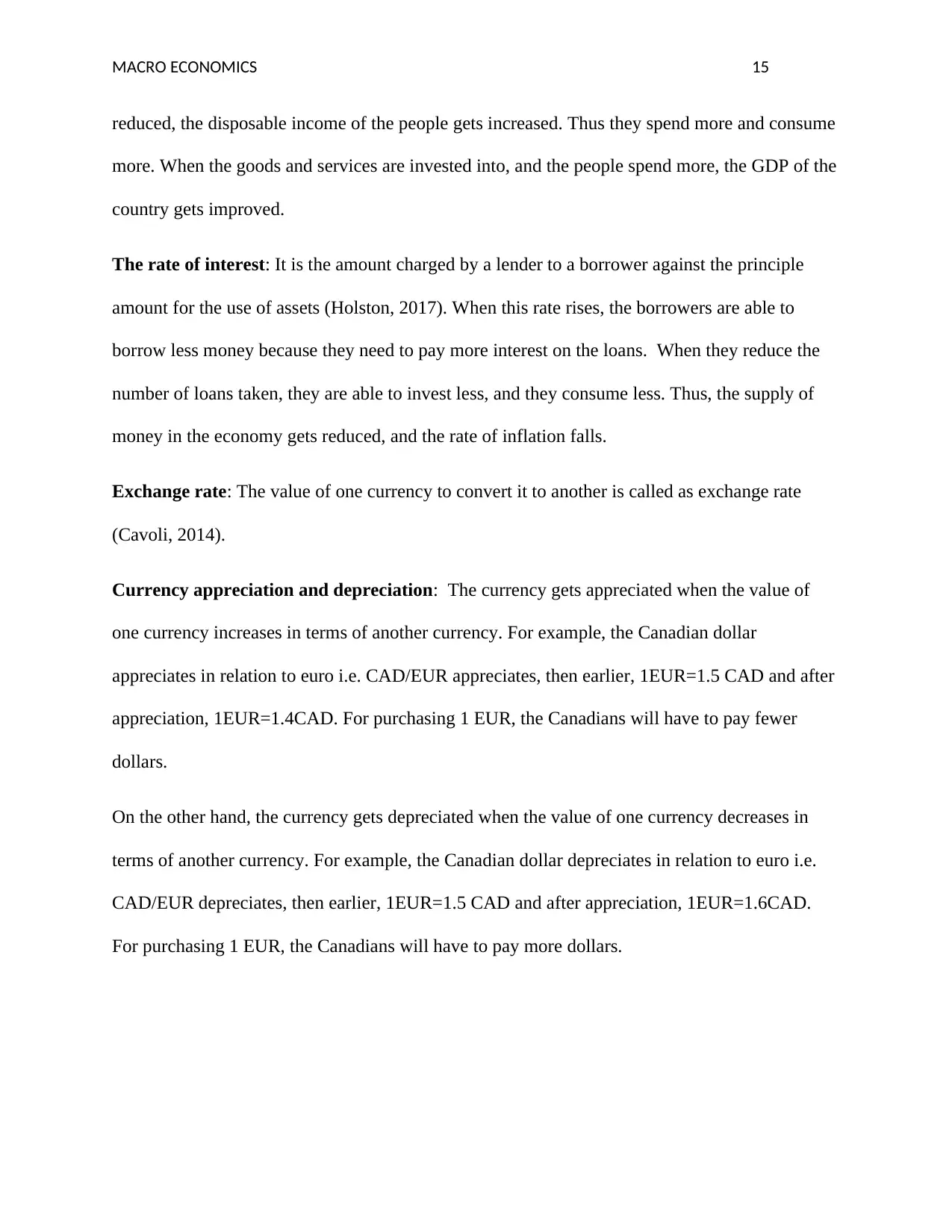
reduced, the disposable income of the people gets increased. Thus they spend more and consume
more. When the goods and services are invested into, and the people spend more, the GDP of the
country gets improved.
The rate of interest: It is the amount charged by a lender to a borrower against the principle
amount for the use of assets (Holston, 2017). When this rate rises, the borrowers are able to
borrow less money because they need to pay more interest on the loans. When they reduce the
number of loans taken, they are able to invest less, and they consume less. Thus, the supply of
money in the economy gets reduced, and the rate of inflation falls.
Exchange rate: The value of one currency to convert it to another is called as exchange rate
(Cavoli, 2014).
Currency appreciation and depreciation: The currency gets appreciated when the value of
one currency increases in terms of another currency. For example, the Canadian dollar
appreciates in relation to euro i.e. CAD/EUR appreciates, then earlier, 1EUR=1.5 CAD and after
appreciation, 1EUR=1.4CAD. For purchasing 1 EUR, the Canadians will have to pay fewer
dollars.
On the other hand, the currency gets depreciated when the value of one currency decreases in
terms of another currency. For example, the Canadian dollar depreciates in relation to euro i.e.
CAD/EUR depreciates, then earlier, 1EUR=1.5 CAD and after appreciation, 1EUR=1.6CAD.
For purchasing 1 EUR, the Canadians will have to pay more dollars.
⊘ This is a preview!⊘
Do you want full access?
Subscribe today to unlock all pages.

Trusted by 1+ million students worldwide

Economics Analysis
(United States election’s resulted into Singapore Technical recession looms. Recession in
technical market ultimately affects the whole economy and main drivers behind that long session
of negative inflation. Singapore's total employment rate will decrease, and unemployment will
rise. Thus, retail sector negatively impact. as a result, people's income is shrinking, so does the
purchasing power decreases, consumption, and aggregate demand will fall, and then the real
GDP will decline As shown in the below diagram:)(THIS PARAGRAPH MUST BE
EXTRACTED FROM THE ARTICLE)
Paraphrase This Document
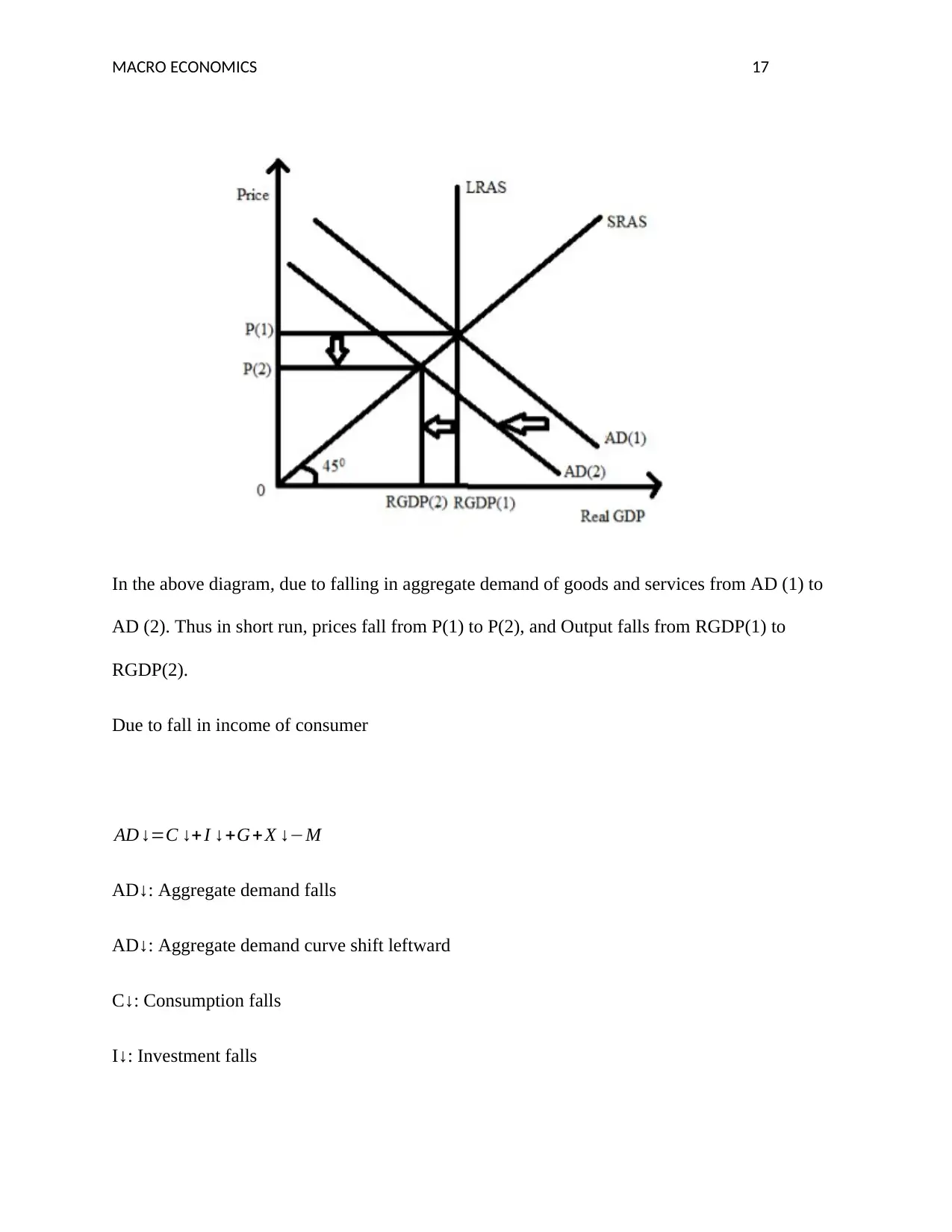
In the above diagram, due to falling in aggregate demand of goods and services from AD (1) to
AD (2). Thus in short run, prices fall from P(1) to P(2), and Output falls from RGDP(1) to
RGDP(2).
Due to fall in income of consumer
AD ↓=C ↓+I ↓+G+X ↓−M
AD↓: Aggregate demand falls
AD↓: Aggregate demand curve shift leftward
C↓: Consumption falls
I↓: Investment falls

P↓: Price level falls, (Deflation)
X↓: Imports falls
RGDP↓: RGDP falls, (Recession), High Unemployment
(Meanwhile, the US dollar has appreciated significantly aginst Asin currencies; US inflation was
unexpected, huge government spendings lead to inflation in the US. As a result, investors are
expecting higher interest rate next year for stabilizing the economy. As a result, there will be capital
outflow from Singapore. Thus, previous one dollar could buy Singdollar (S$) 1.39 has risen up to
S$1.42 on November 8.)( ADD DIAGRAM OF EXPORTS)
However, recession and expansion is a part of the business cycle, which shows the fluctuation in an
economy over a period of time. The expansion is basically a part of economic growth with higher
RGDP, income, and employment. Whereas, a recession is a phase of contraction with falling RGDP
and all real diagram. Diagrammatically, the Business cycle can be represented below:
⊘ This is a preview!⊘
Do you want full access?
Subscribe today to unlock all pages.

Trusted by 1+ million students worldwide
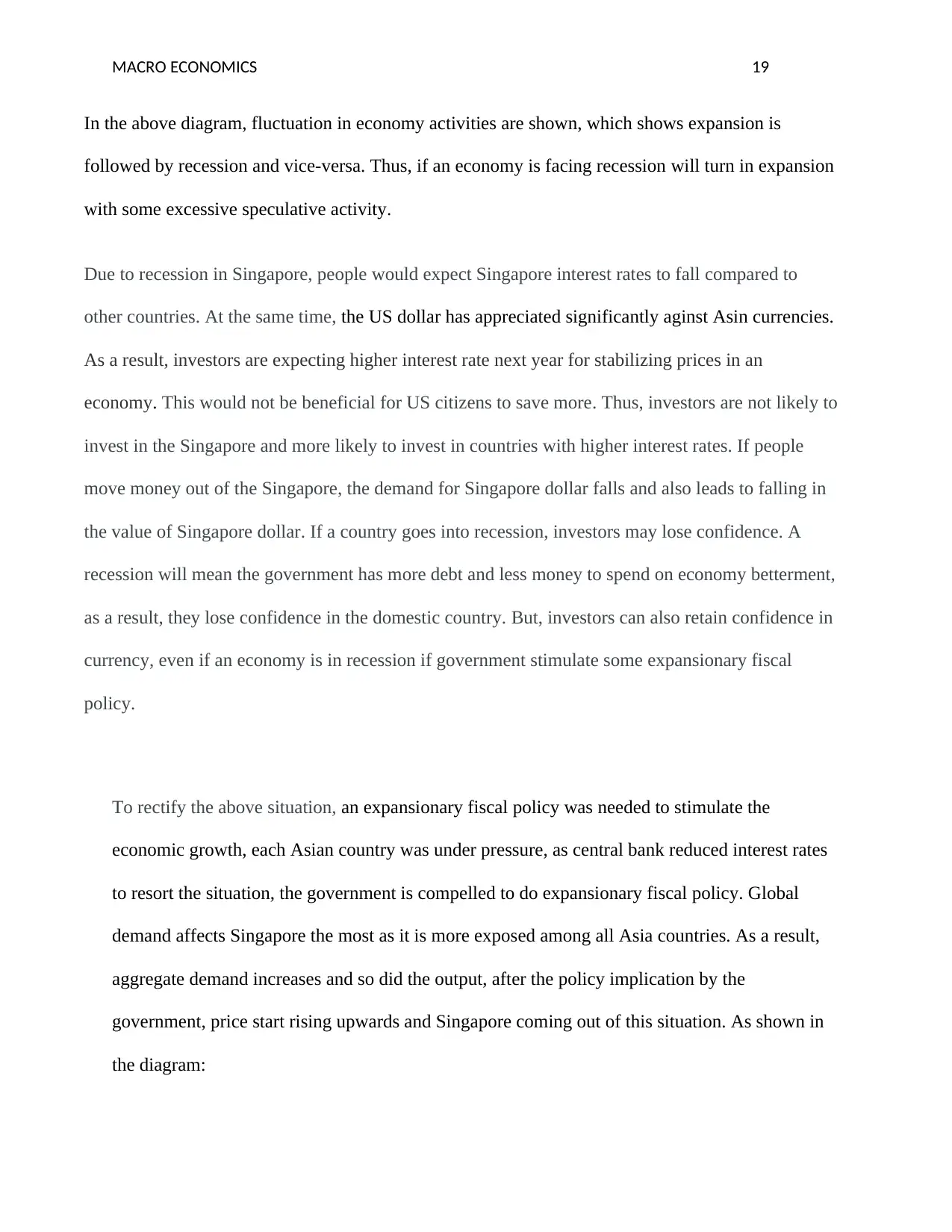
In the above diagram, fluctuation in economy activities are shown, which shows expansion is
followed by recession and vice-versa. Thus, if an economy is facing recession will turn in expansion
with some excessive speculative activity.
Due to recession in Singapore, people would expect Singapore interest rates to fall compared to
other countries. At the same time, the US dollar has appreciated significantly aginst Asin currencies.
As a result, investors are expecting higher interest rate next year for stabilizing prices in an
economy. This would not be beneficial for US citizens to save more. Thus, investors are not likely to
invest in the Singapore and more likely to invest in countries with higher interest rates. If people
move money out of the Singapore, the demand for Singapore dollar falls and also leads to falling in
the value of Singapore dollar. If a country goes into recession, investors may lose confidence. A
recession will mean the government has more debt and less money to spend on economy betterment,
as a result, they lose confidence in the domestic country. But, investors can also retain confidence in
currency, even if an economy is in recession if government stimulate some expansionary fiscal
policy.
To rectify the above situation, an expansionary fiscal policy was needed to stimulate the
economic growth, each Asian country was under pressure, as central bank reduced interest rates
to resort the situation, the government is compelled to do expansionary fiscal policy. Global
demand affects Singapore the most as it is more exposed among all Asia countries. As a result,
aggregate demand increases and so did the output, after the policy implication by the
government, price start rising upwards and Singapore coming out of this situation. As shown in
the diagram:
Paraphrase This Document
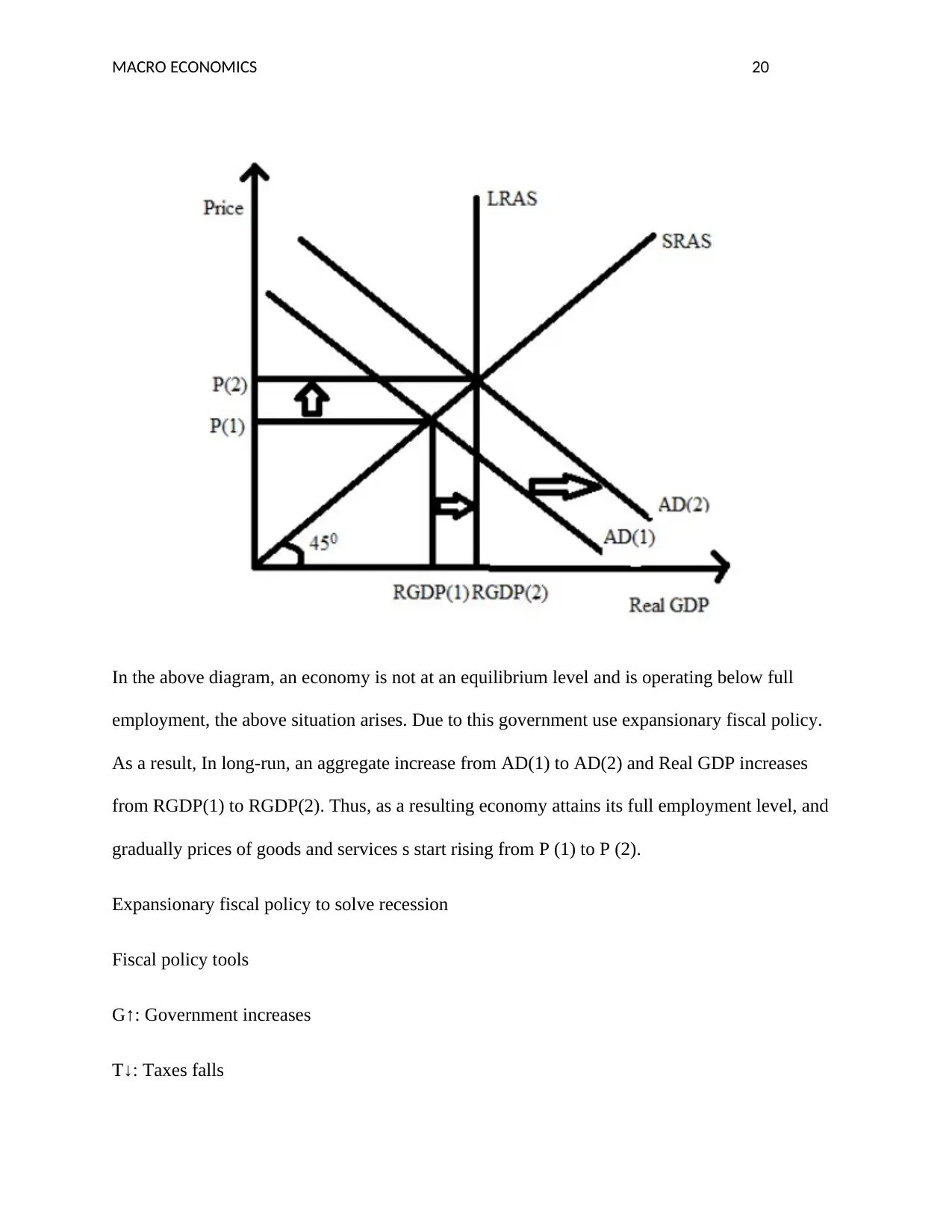
In the above diagram, an economy is not at an equilibrium level and is operating below full
employment, the above situation arises. Due to this government use expansionary fiscal policy.
As a result, In long-run, an aggregate increase from AD(1) to AD(2) and Real GDP increases
from RGDP(1) to RGDP(2). Thus, as a resulting economy attains its full employment level, and
gradually prices of goods and services s start rising from P (1) to P (2).
Expansionary fiscal policy to solve recession
Fiscal policy tools
G↑: Government increases
T↓: Taxes falls
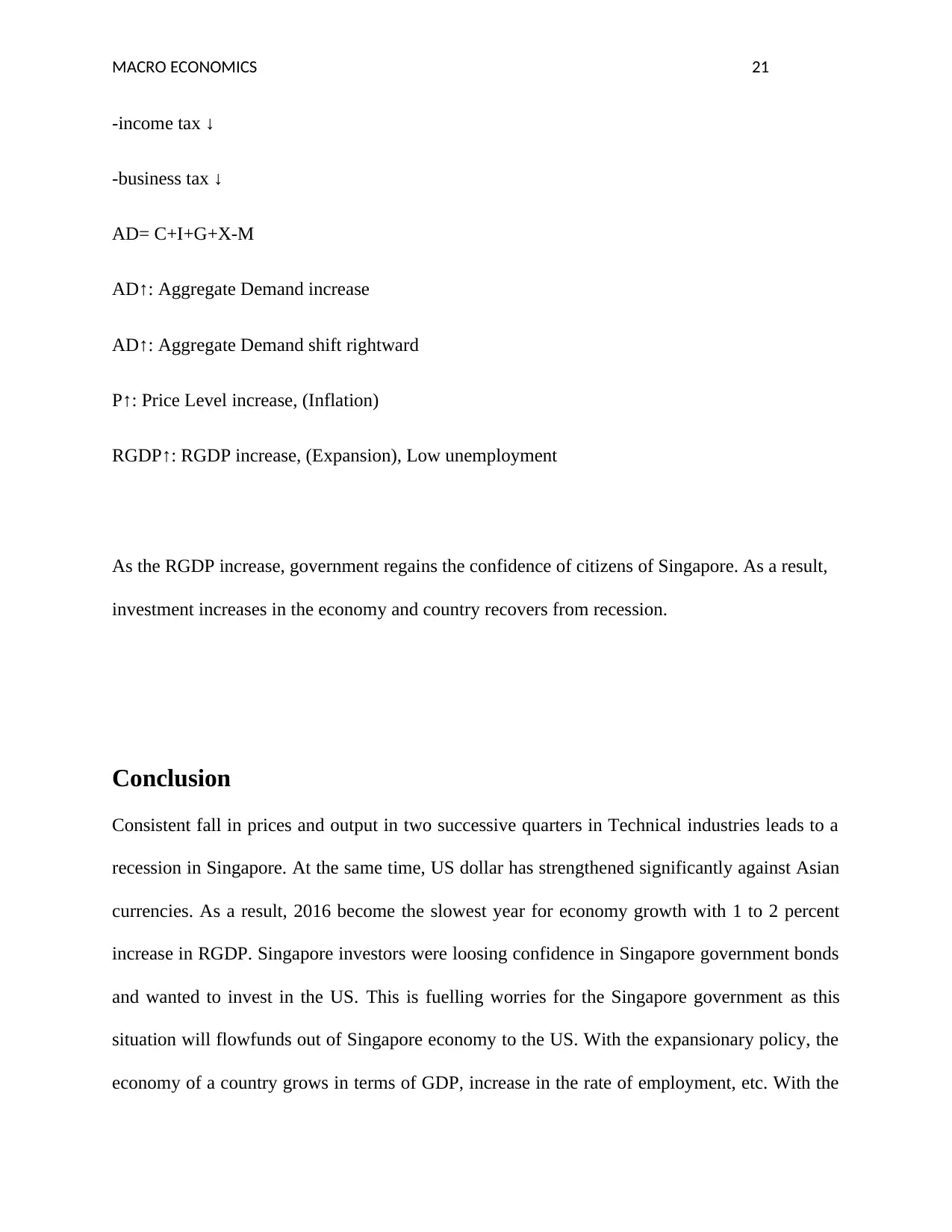
-income tax ↓
-business tax ↓
AD= C+I+G+X-M
AD↑: Aggregate Demand increase
AD↑: Aggregate Demand shift rightward
P↑: Price Level increase, (Inflation)
RGDP↑: RGDP increase, (Expansion), Low unemployment
As the RGDP increase, government regains the confidence of citizens of Singapore. As a result,
investment increases in the economy and country recovers from recession.
Conclusion
Consistent fall in prices and output in two successive quarters in Technical industries leads to a
recession in Singapore. At the same time, US dollar has strengthened significantly against Asian
currencies. As a result, 2016 become the slowest year for economy growth with 1 to 2 percent
increase in RGDP. Singapore investors were loosing confidence in Singapore government bonds
and wanted to invest in the US. This is fuelling worries for the Singapore government as this
situation will flowfunds out of Singapore economy to the US. With the expansionary policy, the
economy of a country grows in terms of GDP, increase in the rate of employment, etc. With the
⊘ This is a preview!⊘
Do you want full access?
Subscribe today to unlock all pages.

Trusted by 1+ million students worldwide

rise, people regain confidence in Singapore dollar. Thus investment rises in Singapore, as a
result, the employment rate will rise, and thus, the full employment will be reached after a
certain point of time. When all the people who are able to work and who want to work are
earning in the economy, then the money supply in the country will rise. They will spend more
and invest more.
References
Afonso, G., & Lagos, R. (2015). Trade dynamics of the market for federal
funds. Econometrica, 83(1), 263-313.
Beveridge, W. H. (2014). Full Employment in a Free Society (Works of William H. Beveridge):
A Report (Vol. 6).
Hansen, A. H. (2013). Fiscal policy & business cycles. Routledge.
Paraphrase This Document

Holston, K., Laubach, T., & Williams, J. C. (2017). Measuring the natural rate of interest:
International trends and determinants. Journal of International Economics.
https://www.bloomberg.com/.../2016.../singapore-plans-expansionary-budget-as-grow.
Min, C. (2017). 'Technical recession looms' for Singapore. The Straits Times. from
http://www.straitstimes.com/business/economy/technical-recession-looms-for-spore
Moran, T. (2014). The United States Budget Deficit and Social Security Games.
Moschella, M. (2015). Currency wars in the advanced world: Resisting appreciation at a time of
change in central banking monetary consensus. Review of International Political
Economy, 22(1), 134-161.
Routledge.Import competition in the United States. The American Economic Review, 103(6),
2121-2168.
Weale, M., Blake, A., Christodoulakis, N., Meade, J. E., & Vines, D. (2015). Macroeconomic
Policy: Inflation, Wealth and the Exchange Rate (Vol. 8). Routledge.
Both of the articles are from straitstimes.com
Topic of article 1: Singapore consumer prices rise for 2nd straight month in January on
recovering oil prices
http://www.straitstimes.com/business/economy/singapore-consumer-prices-rise-for-2nd-straight-
month-in-january-on-recovering-oil
Topic of article 2: Technical recession looms' for Singapore
http://www.straitstimes.com/business/economy/technical-recession-looms-for-spore.
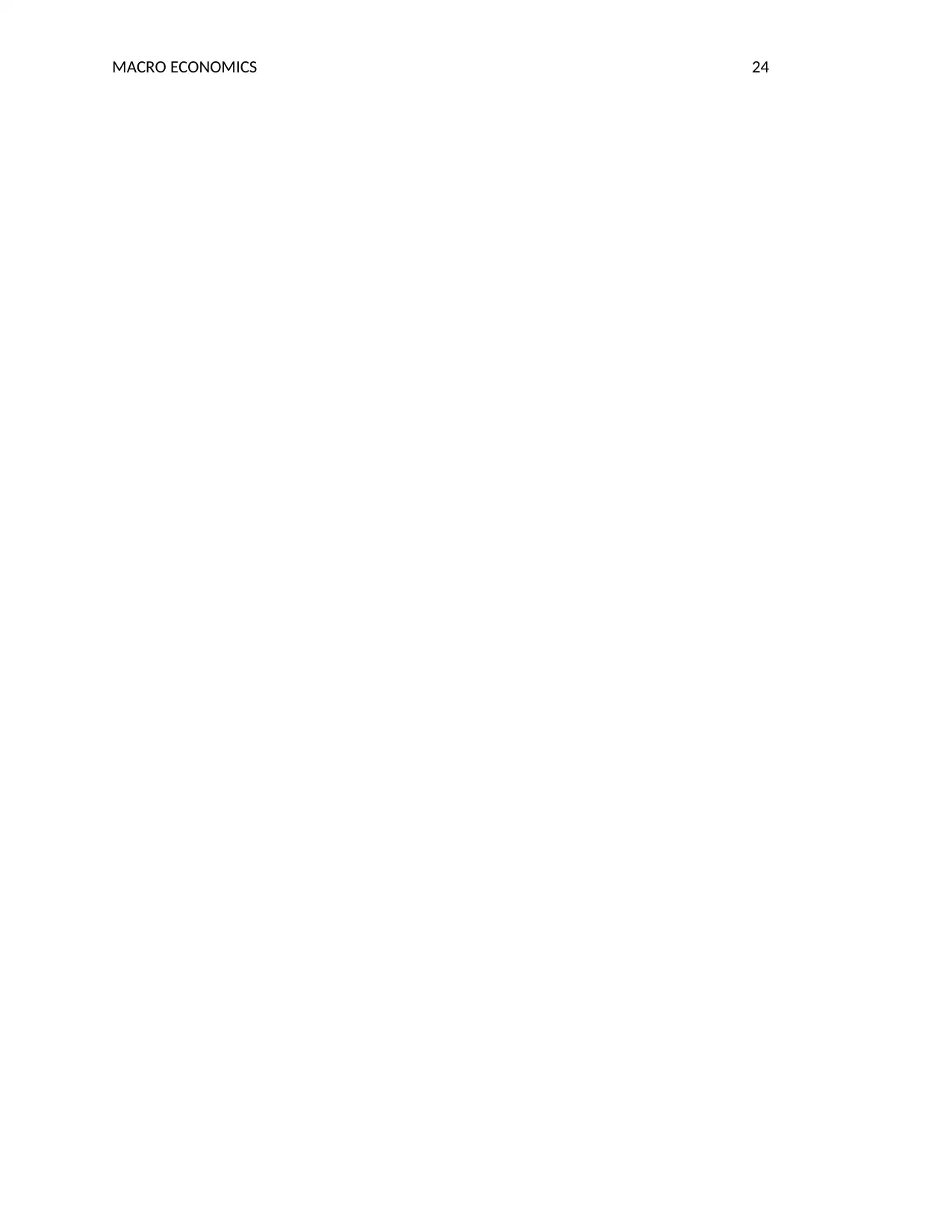
⊘ This is a preview!⊘
Do you want full access?
Subscribe today to unlock all pages.

Trusted by 1+ million students worldwide
Related Documents
Your All-in-One AI-Powered Toolkit for Academic Success.
+13062052269
info@desklib.com
Available 24*7 on WhatsApp / Email
![[object Object]](/_next/static/media/star-bottom.7253800d.svg)
© 2024 | Zucol Services PVT LTD | All rights reserved.





